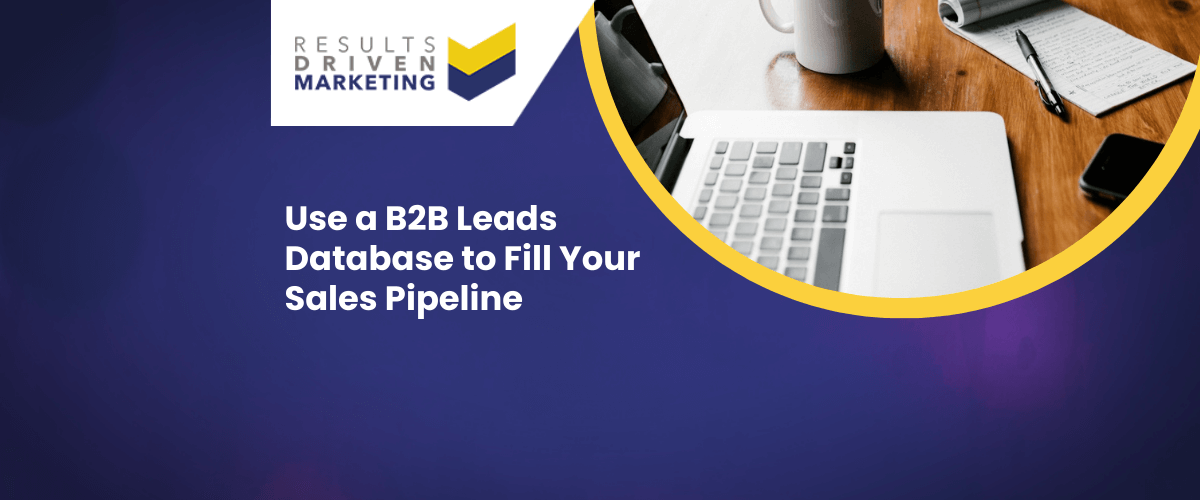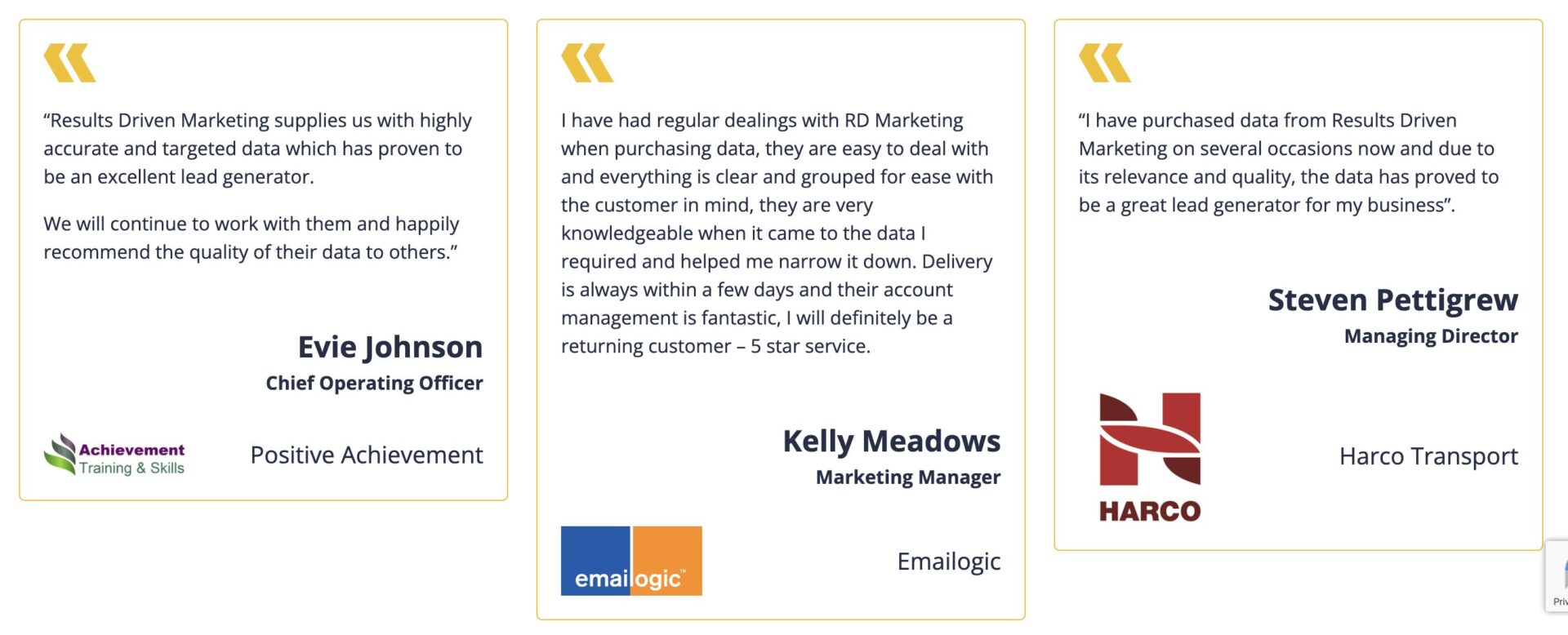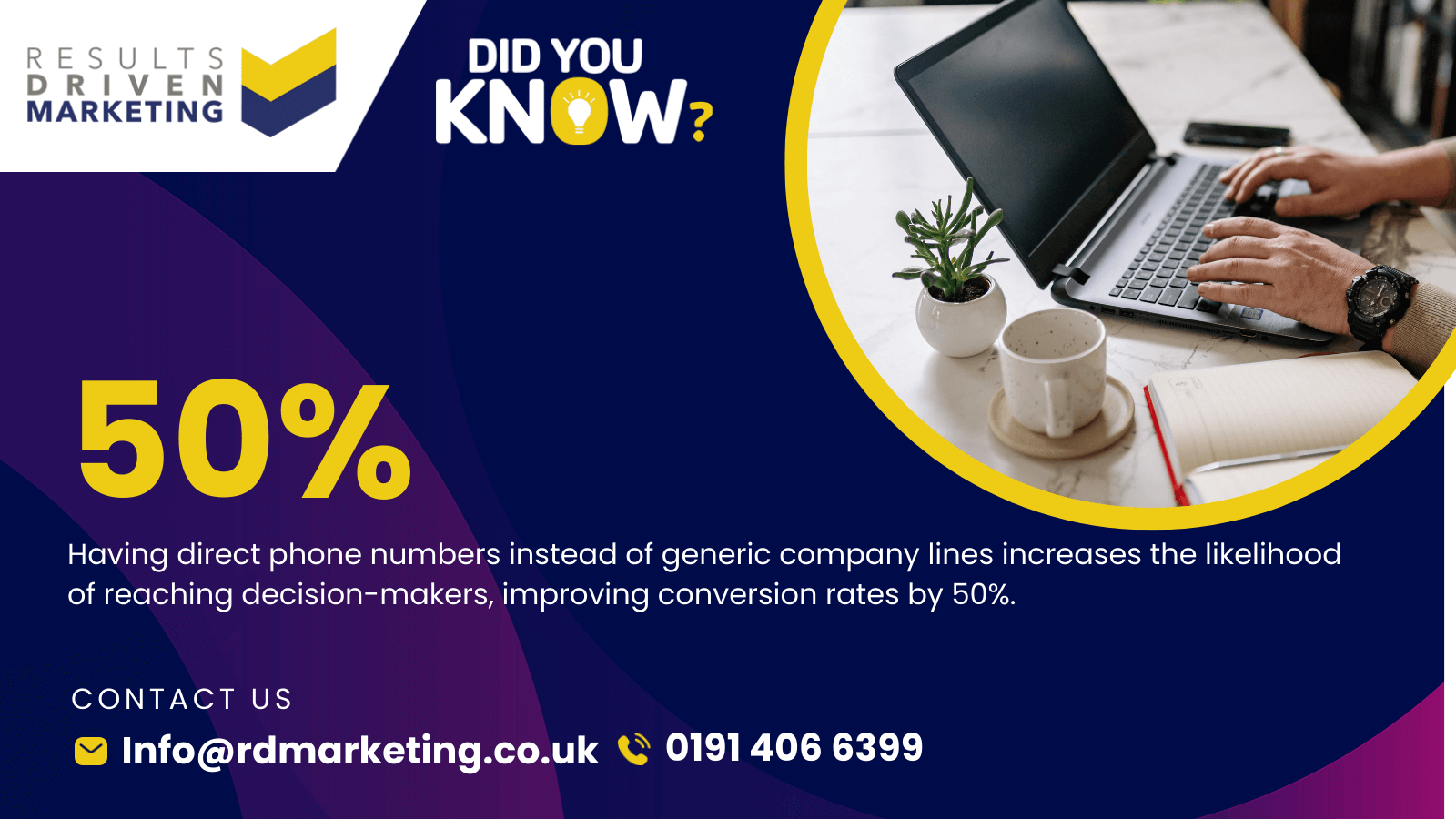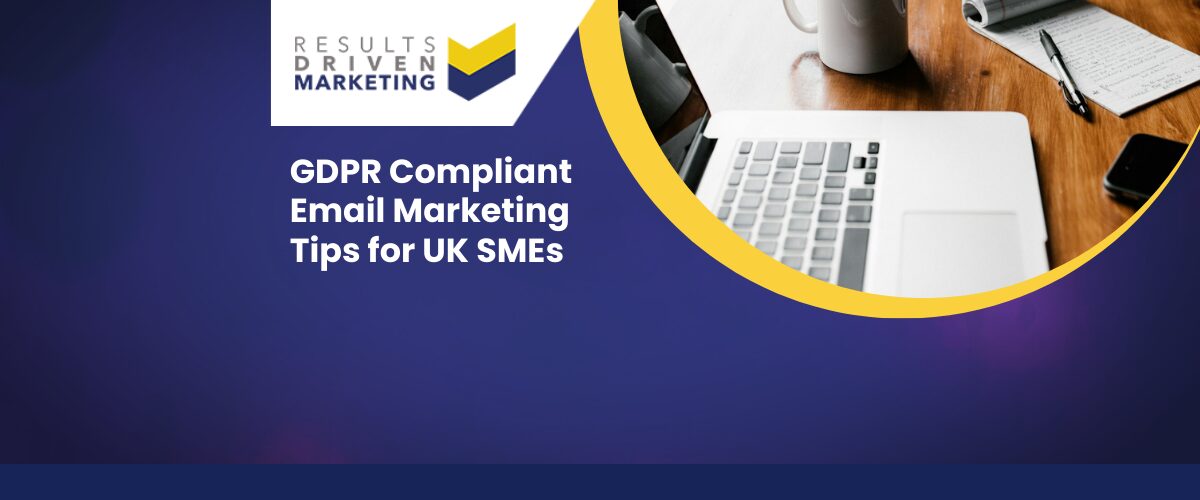
B2B Leads Database Will Fill Your Sales Pipeline
A B2B Leads Database is the key to filling your sales pipeline with targeted, high-quality business contacts who are more likely to convert. Without access to accurate B2B data, businesses struggle to generate consistent leads, leading to wasted time, missed opportunities, and declining sales performance.
By leveraging a B2B Leads Database, companies can identify decision-makers, personalise outreach, and improve engagement across email marketing, telemarketing, and direct mail campaigns. But not all databases provide the accuracy, compliance, and segmentation needed to drive results. That’s why businesses turn to trusted providers like RD Marketing for verified, GDPR-compliant B2B data that maximises ROI.
A B2B Leads Database is a structured collection of business contacts, including:
- Company details (name, industry, location, and size)
- Decision-maker information (job title, department, and seniority level)
- Email addresses and direct phone numbers
- Data for telemarketing, email, and direct mail campaigns
This valuable resource allows businesses to target prospects efficiently, ensuring that outreach efforts reach the right audience. Whether you need Email Address List Data for email marketing or Telemarketing Data for cold calling, a high-quality B2B Leads Database eliminates guesswork and improves sales performance.
Table of contents:
What is a Business Leads Database?
A B2B leads database is a structured collection of information about potential business clients or partners in the business-to-business (B2B) sector. Typically, this database includes details like company names, contact information, industry classification, revenue figures, and other relevant data points.
The primary purpose of a B2B leads database is to assist businesses in identifying and reaching out to potential clients or partners, streamlining sales and marketing efforts. As digital transformation continues to influence the B2B leads database landscape, having access to a comprehensive B2B leads database becomes paramount for businesses to stay competitive, personalise outreach, and accelerate their growth trajectory.
What are B2B Leads Databases used for?
B2B leads databases are pivotal resources that businesses deploy for a myriad of strategic operations within the corporate landscape. Here’s a closer look at the primary applications of a B2B leads database:
Sales Prospecting
Utilising a B2B leads database, sales teams can efficiently pinpoint potential business clientele, streamlining outreach and sales initiatives.
Direct Marketing Campaigns
Leveraging the detailed information in the B2B leads database, businesses can execute targeted marketing drives, ensuring their offerings resonate with the right corporate audience.
Market Analysis
A B2B leads database is an invaluable asset for gleaning insights about industry shifts, potential market voids, and competitive landscapes, enabling refined strategy development.
Industry Networking
Organisers of events, webinars, and seminars can draw from the B2B leads database to discern and invite pertinent industry players, fostering productive engagement.
Content Dissemination
To circulate significant industry content, be it whitepapers or case studies, the database ensures it reaches its intended business audience, amplifying its efficacy.
Partnership Exploration
Firms scouting for collaborations or joint ventures can delve into the B2B leads database to identify potential synergies.
Client Segmentation
Using the expansive data from the database, companies can categorise potential clients, allowing for a tailored and impactful outreach.
Competitive Reconnaissance
By harnessing the B2B leads database, businesses can comprehend their competitors’ standing and strategise to secure a market advantage.
B2B Lead Prioritisation
With the granular details from the database, businesses can discern and prioritise B2B leads, ensuring they chase the most promising opportunities.
Integration with CRM
Many companies merge their B2B leads database with their Customer Relationship Management systems, consolidating lead interactions and sales tracking.
In summation, a B2B leads database is not merely a directory; it’s an instrumental tool driving various business functions, from sales and marketing thrusts to industry research and collaborations, proving indispensable for holistic business growth.
Why Buy a Business Leads Database from Results Driven Marketing?
When it comes to connecting with senior purchasing decision-makers within UK SMEs, a high-quality B2B leads database is an invaluable asset. At Results Driven Marketing, we specialise in providing businesses with precisely the tools they need to achieve their marketing and sales goals. Here’s why we’re the trusted choice for businesses looking to make the most of their B2B outreach:
- Tailored Precision: Our B2B leads databases are curated to match your specific needs. Whether you’re targeting by industry, location, or company size, we ensure you’re reaching the right decision-makers who are ready to engage with your products or services.
- Accurate and Up-to-Date: Outdated data can derail your campaigns. Our databases are regularly refreshed to ensure accuracy, giving you confidence that your outreach efforts will hit the mark.
- GDPR-Compliant: We prioritise compliance, providing you with GDPR-compliant data that protects your business and builds trust with your audience.
- Proven ROI: Clients using our B2B leads databases consistently see higher engagement rates, better-qualified leads, and more closed deals, making them a cost-effective investment for growth.
- Expert Support: With over 7 years of experience, our team offers guidance to help you maximise your database’s potential, whether it’s through strategic segmentation or tailored email campaigns.
When you choose Results Driven Marketing, you’re not just purchasing a B2B leads database—you’re gaining a powerful tool designed to help your business connect, grow, and succeed. Let’s work together to take your campaigns to the next level!
What Our Clients Say About Our Business Leads Database
At Results Driven Marketing, we’re proud to have helped countless businesses achieve their sales and marketing goals with our reliable B2B leads database. From connecting with senior decision-makers to driving exceptional ROI, our clients consistently see the impact of working with high-quality, GDPR-compliant data.
Here’s what some of them have to say:
Check out more glowing feedback from our clients on our Testimonials Page.
Want to see how much value a B2B leads database can bring to your business? Try our ROI Calculator to explore the potential impact on your campaigns. Let us help you take your marketing to the next level!
How Other Businesses Are Leveraging a Business Leads Database to Their Benefit
A business leads database is an essential tool for companies looking to connect with the right audience and achieve measurable growth. Businesses across industries are using these databases to enhance their marketing and sales strategies, streamline their outreach, and drive meaningful results. Here’s how savvy companies are putting a business leads database to work:
1. Generating High-Quality Leads
Businesses are leveraging targeted databases to identify and connect with decision-makers who fit their ideal customer profile. By focusing their efforts on qualified prospects, they save time and increase the chances of conversions.
For example, a software company targeting small and medium-sized enterprises (SMEs) can use a business leads database to directly reach IT managers or procurement officers, ensuring their pitch lands with the right audience.
2. Boosting Sales Efficiency
Sales teams are using business leads databases to streamline their processes, enabling them to focus on prospects who are more likely to convert. With detailed insights such as job titles, industries, and company size, they can craft personalised pitches that resonate with potential clients.
This approach reduces the time spent on cold calling and increases the likelihood of successful sales.
3. Driving Event Attendance
Event organisers use a business leads database to invite the right audience to webinars, conferences, and networking events. By targeting specific industries or job roles, they ensure high attendance rates and engaged participants.
For instance, a marketing agency might use the database to reach marketing directors in SMEs, inviting them to a webinar on the latest B2B marketing trends.
4. Expanding Into New Markets
Companies looking to enter new markets or regions use business leads databases to identify potential customers in their target area. By providing accurate and relevant data, these databases make it easier for businesses to break into new territories confidently.
For example, a logistics company expanding into the UK market could use the database to connect with SMEs in need of supply chain solutions.
5. Personalising Marketing Campaigns
A business leads database enables companies to segment their audience and deliver personalised marketing campaigns. By using data such as industry, location, or past interactions, businesses can craft targeted messaging that resonates with specific groups.
Personalisation increases engagement and builds stronger relationships with potential customers, leading to higher conversions.
6. Improving ROI
By focusing on high-quality, relevant leads, businesses maximise the return on their marketing investment. A business leads database helps eliminate wasted efforts on unqualified prospects, ensuring every campaign is more cost-effective and impactful.
For example, an accounting firm targeting financial directors in SMEs can create focused campaigns that speak directly to their needs, resulting in better ROI.
7. Building Long-Term Relationships
Beyond initial outreach, businesses are using leads databases to nurture relationships over time. By maintaining an up-to-date database, companies can stay connected with prospects, providing valuable content and offers that keep them engaged.
This approach fosters trust and positions the business as a reliable partner, increasing the likelihood of future collaborations.
8. Supporting Multi-Channel Marketing
A business leads database isn’t just for email marketing—it supports multi-channel efforts, including telemarketing, direct mail, and social media campaigns. By providing a single source of accurate, organized data, it helps businesses maintain consistency across all channels.
For example, a manufacturing company could use the database for telemarketing outreach while simultaneously running an email campaign targeting procurement managers.
Leveraging a business leads database is about more than just finding contacts—it’s about using data strategically to connect, engage, and grow. Companies that harness the power of these databases are seeing better results, from increased sales to stronger customer relationships.
Ready to see what a business leads database can do for your company? Start using this valuable tool to unlock new opportunities and drive measurable success.
Maximise Your B2B Leads Database with Responder and Managed Email Marketing Services
A business leads database is a powerful tool for reaching decision-makers and driving results. To make the most of it, you need the right tools and services to execute your campaigns effectively. Whether you prefer managing your own campaigns or want a fully managed solution, we have you covered.
Send Campaigns with Ease Using Responder
Responder is our intuitive email marketing platform, designed to help you leverage your business leads database to connect with UK SMEs effortlessly. With Responder, you can take full control of your email marketing while enjoying a seamless, user-friendly experience.
Key benefits of Responder include:
- Accepts All Email Lists: Responder integrates seamlessly with your business leads database, no matter where it comes from.
- Super Cost-Effective: Get all the tools you need for impactful campaigns without breaking the budget.
- Easy to Use: Responder’s intuitive interface ensures you can create, manage, and analyse campaigns with ease—even if you’re a beginner.
- Full Support Provided: Our team is always on hand to assist with setup, troubleshooting, and optimisation, ensuring you get the most out of your campaigns.
Responder is the perfect solution for businesses ready to take charge of their email marketing strategy while maximising the value of their business leads database.
Leave the Work to Us with Managed Email Marketing Services
If you’d rather focus on your core business while leaving the email marketing to experts, our Managed Email Marketing Campaign Services are here to help.
What we offer:
- Bespoke HTML Email Design: Our design team creates professional, eye-catching emails tailored to your brand and message, ensuring your campaigns stand out in crowded inboxes.
- Targeted Campaign Execution: Using your business leads database, we handle the entire process of sending campaigns to senior decision-makers within UK SMEs.
- Performance Optimisation: From A/B testing to detailed analytics, we ensure your campaigns deliver maximum impact by refining every element.
With our managed services, you can trust that your campaigns are executed to perfection, leaving you free to focus on driving your business forward.
Whether you want to take the reins with Responder or prefer a hands-off approach with our managed services, we provide everything you need to turn your business leads database into a powerful engine for growth. Let us help you achieve better engagement, higher conversions, and measurable results today!
The Crucial Role of B2B Leads Databases in Modern Business
In today’s hyper-competitive business environment, understanding your audience and reaching them effectively is paramount. Central to this understanding and outreach are B2B leads databases. These databases, often overlooked, play a fundamental role in shaping the success trajectory of countless businesses. But what makes them so vital? Let’s dive in.
Precision in Targeting
B2B leads databases provide detailed insights about potential business clients, from company size and revenue to industry specifics and decision-maker contacts. This granularity allows for tailored marketing and sales strategies that resonate deeply with the target audience.
Time and Resource Efficiency
Sifting through the vast expanse of the business landscape to identify potential B2B leads can be time-consuming and resource-intensive. B2B leads databases cut through this clutter, offering a curated list of potential business partners and clients, streamlining outreach efforts.
Competitive Edge
In a world where businesses vie for the attention of a limited pool of potential B2B connections with clients, those equipped with a comprehensive B2B leads database are a step ahead. The ability to quickly identify and act on potential B2B leads can be the difference between securing a lucrative contract and being left behind.
Informed Decision Making
Beyond just names and contacts, B2B leads databases often carry valuable information about industry trends, challenges, and opportunities. This data aids businesses in making informed decisions, be it in product development, service refinement, or marketing strategy.
Enhanced Networking Opportunities
With a clear view of industry stakeholders, businesses can more effectively engage in networking, be it through conferences, webinars, or industry events. A robust leads database ensures you connect with the right people at the right time.
Improved ROI on Marketing Campaigns
Random, scattergun approaches to B2B leads database for marketing rarely yield the desired results. With B2B leads databases, marketing efforts are laser-focused on a relevant audience, ensuring higher engagement, conversion rates, and ultimately, a better return on investment.
Facilitating Growth and Expansion
For businesses looking to expand into new markets or industries, leads databases offer a treasure trove of insights. Identifying potential clients, partners, or even competitors in a new market becomes significantly easier.
Seamless Integration with CRM Systems
Modern B2B leads databases can be seamlessly integrated with Customer Relationship Management systems. This integration allows for efficient tracking, management, and nurturing of leads, driving sales and fostering lasting business relationships.
In conclusion, the significance of B2B leads databases in today’s business landscape cannot be understated. They are not just repositories of information but strategic assets that drive decision-making, foster connections, and fuel business growth. As competition intensifies, having a well-structured and comprehensive leads database can be the linchpin of sustained business success.
Main Benefits of Using a B2B Leads Database
In the realm of business-to-business operations, the ability to connect with the right stakeholders can spell the difference between growth and stagnation. Central to this is the B2B leads database. Here’s a look at the standout benefits of harnessing such a database:
Precision Targeting
A B2B leads database provides granular details about potential clients or partners. This specificity allows businesses to tailor their outreach campaigns, ensuring that they resonate with the intended audience, thereby increasing the chances of successful conversions.
Resource Efficiency
Time is an invaluable resource. Instead of scouring the vast business ecosystem for leads, a B2B leads database presents businesses with a curated list of potential contacts, ensuring that outreach efforts are concise and directed.
Enhanced Competitive Advantage
With the insights gleaned from the database, businesses can stay a step ahead of competitors. Quick identification and engagement with potential leads often translate to winning contracts and forging beneficial partnerships.
Data-Driven Decision Making
Beyond the contact details, a B2B leads database can offer insights into market trends, company sizes, and industry sectors. This wealth of data aids in making informed strategic decisions, be it in marketing, product development, or service offerings.
Improved ROI on Marketing Initiatives
With a focused target list derived from the B2B leads database, marketing campaigns can achieve higher engagement and conversion rates. This precision ensures that every marketing dollar spent is more likely to yield a positive return.
Facilitation of Networking
Knowing who to connect with in industry events, seminars, or conferences becomes streamlined with a comprehensive database. The right connections can open doors to collaborations, partnerships, or client relationships.
Efficient Segmentation
With the diverse data points in a business leads database, businesses can segment their audience based on various criteria like industry type, company size, or geographic location. This enables more personalised and effective outreach campaigns.
Seamless CRM Integration
Many modern B2B leads databases are designed for easy integration with Customer Relationship Management systems. This synergy allows for efficient lead tracking, nurturing, and management, ensuring no opportunity slips through the cracks.
Scalability and Growth of your Business Leads Database
For businesses eyeing expansion or diversification, a B2B leads database offers invaluable insights into new markets or industries, paving the way for informed strategic moves.
In summary, a B2B leads database is not just a collection of contact details; it’s a strategic asset that empowers businesses to navigate the B2B leads database landscape with precision, efficiency, and intelligence. In an era of information overload, having a structured and insightful b2b leads database is a genuine game-changer.
Understanding the Different Types of B2B Leads Databases
In the intricate world of business-to-business (B2B) marketing and sales, B2B leads databases stand as invaluable resources. However, not all databases are created equal. Depending on the specific requirements of a business, there are several types to consider. Here’s a comprehensive overview of the various types of B2B leads databases available:
Industry-Specific Business Leads Databases
These databases are curated for specific industries or sectors, such as healthcare, technology, or manufacturing. They provide detailed information about businesses operating within a particular industry, ensuring targeted outreach for companies in niche markets.
Geographic Databases
Geared towards location-specific leads, these B2B leads databases cater to businesses looking to target a specific region, country, or even city. They are especially useful for regional sales campaigns or location-based marketing initiatives.
Size-Oriented Databases
Some databases categorise B2B leads based on the size of the company, often delineated by revenue, number of employees, or market share. These are beneficial for businesses tailoring their products or services to SMEs, startups, or large enterprises.
Function-Based Databases
These B2B leads databases are curated based on specific functions or departments within companies. Examples include databases that exclusively list IT decision-makers, HR managers, or procurement heads, ensuring that outreach is directed to the right departmental function.
Event Attendees Databases
Post-conferences, trade shows, or seminars, organisers often compile databases of attendees, exhibitors, or speakers. These are invaluable for businesses seeking to network or follow-up post-event.
Technographic Databases
A newer addition to the B2B leads databases spectrum, technographic databases offer insights into the technology stack used by companies. This includes the software, platforms, and tools they use, beneficial for tech vendors or service providers.
Intent Data Databases
These databases focus on potential leads that have shown a specific interest or intent in a product or service, usually derived from online behaviour, content interactions, or inquiries. They are crucial for businesses aiming to target prospects who are further along the buying journey.
Custom Databases
Some providers offer bespoke database solutions, tailored to the unique requirements of a business. This can be a combination of several criteria like geography, industry, and company size.
In conclusion, B2B leads databases have evolved to cater to the diverse needs of businesses in today’s dynamic environment. Choosing the right type is pivotal to ensuring marketing and sales efforts are both efficient and effective. As always, it’s imperative for businesses to ensure that any database they utilise adheres to privacy regulations and ethical standards.
How to Build a B2B Leads Database: A Comprehensive Guide
In the age of information, having a robust B2B leads database is crucial for companies aiming to foster connections, drive sales, and grow their business. But how do you build one from scratch? Here’s a step-by-step guide to creating a dynamic and useful B2B leads database:
Define Your Target Audience
Before you start, clarify who your ideal business clients are. Consider factors like industry, company size, geographic location, and their pain points. This ensures that your B2B leads database is targeted and relevant.
Leverage Existing Connections
Go through your existing contacts, business cards, and CRM system. These can be the foundation of your B2B leads database. Categorise and segment them based on relevancy and potential.
Attend Industry Events
Trade shows, conferences, and seminars are goldmines for leads. Attend relevant events, network effectively, and remember to gather business cards and contact details.
Use Online Directories
Platforms like LinkedIn, industry-specific directories, and business listing sites can be great resources. However, ensure you have permission to store and use the information in compliance with regulations.
Create Valuable Content
Offer valuable content like ebooks, whitepapers, or webinars in exchange for contact information. This not only helps in growing your database but ensures that the leads have a genuine interest in your offerings.
Optimise Website Forms:
Make sure your website has forms for newsletters, contact inquiries, or downloadable resources. The data collected can be integrated into your B2B leads database.
Purchase or Rent Lists
While this approach can provide quick results, it’s essential to ensure that the business lists are up-to-date, compliant with data protection regulations, and relevant to your target audience. Talk to us today if you are interested in buying b2b data.
Collaborate with Complementary Businesses
Partnerships can offer access to new audiences. For example, if you provide IT solutions, collaborate with a hardware vendor to share databases, ensuring mutual growth.
Regularly Update and Cleanse the Database
A B2B leads database is only as good as its accuracy. Regularly review and update the database, removing outdated information and adding new leads. This ensures you’re always working with fresh, relevant data.
In summary, building a B2B leads database is not a one-time activity but an ongoing process. The key is to strike a balance between organic, self-driven methods, and utilising external tools or platforms. By ensuring that your database is always targeted, compliant, and up-to-date, you position your business for sustained growth and meaningful B2B connections.
Segmenting a Business Leads Databases for Better Targeting
In the realm of B2B marketing, a one-size-fits-all approach rarely delivers optimal results. Tailoring your outreach based on specific criteria can significantly boost engagement and conversion rates. Central to this is understanding how to segment your B2B leads database. Here’s a guide to effectively segment and refine your outreach:
Industry or Sector
Segmenting your b2b contact lists by industry can help you tailor messaging to address the unique needs and pain points of each sector. Whether you’re dealing with healthcare, finance, or tech companies, industry-focused campaigns often resonate more.
Company Size
Different-sized companies have varying needs. By segmenting based on company size (like SMEs, startups, or large enterprises), you can customise solutions and communication to align with their scale.
Geographic Location
Localising your campaigns based on geography can lead to more personal and relevant interactions. Segmenting your B2B leads database by city, region, or country allows for targeted outreach, taking into account cultural nuances and regional demands.
Job Function or Role
Not every lead in your database will have the same role. Segmenting based on job functions like IT, HR, or Procurement ensures you’re communicating with the right department, addressing their specific needs.
Buying Stage
Understanding where a lead is in the buying journey can inform the type of content or communication they receive. Segment your business leads database into categories like awareness, consideration, or decision stage to tailor your approach.
Past Engagement
Leads that have previously engaged with your brand, whether through prior purchases, content downloads, or webinars, can be segmented into a separate group. This allows for follow-up campaigns or targeted upselling.
Technological Stack
For companies offering tech solutions, understanding a lead’s current technology stack can be invaluable. This segmentation can highlight potential needs or compatibility issues.
Sales Cycle Duration
If certain leads tend to have longer or shorter sales cycles, segmenting them accordingly can help in customising follow-ups and nurturing strategies.
Purchase History
Repeat customers or those who’ve made significant purchases in the past may require different communication compared to new leads. Segmenting your business leads database based on purchase history can inform loyalty programs or upselling opportunities.
Behavioural Signals
Monitor and segment leads based on their online behaviours, like the content they engage with, web pages visited, or emails opened. This can give insights into their interests and needs.
In summary, segmenting your B2B leads database is not just about organising data; it’s about refining your outreach to resonate with the unique facets of each lead. Through effective segmentation, businesses can ensure more personalised, relevant, and successful B2B marketing campaigns, fostering deeper connections and driving growth.
How to Maintain a B2B Leads Database: Ensuring Quality and Relevance
A B2B leads database is an indispensable asset for businesses, but its value diminishes if not maintained properly. Like a well-tended garden, a database requires regular care to remain fruitful. Here’s a comprehensive guide on ensuring your B2B leads database stays current, clean, and actionable:
Regular Cleansing
Over time, data can become outdated. Regularly remove or update inaccurate or obsolete entries from your B2B leads database. This includes leads that have changed companies, invalid email addresses, or redundant entries.
Validate Data Entry Points
Ensure that the points of data entry, like web forms, have validation checks. This can prevent incorrect data (e.g., wrongly formatted emails) from entering the database in the first place.
Segment and Categorize
Regularly segmenting your database ensures that leads are categorised correctly. This not only helps in targeted outreach but also in monitoring data quality within specific segments.
Monitor Engagement
Keep tabs on which leads are engaging with your communications. If certain leads consistently show no engagement, it might be time to either update their details, shift them to a different segment, or remove them from primary campaigns.
Use Automated Tools
There are numerous tools available that can help in maintaining the integrity of your business leads database. From data validation to deduplication tools, leveraging technology can streamline maintenance processes.
Regular Backups
To prevent data loss, regularly back up your B2B leads database. This ensures that in the event of technical glitches, human errors, or cyber threats, your valuable data remains safeguarded.
Stay Compliant with Regulations
With the emergence of data protection regulations like GDPR, it’s essential to periodically review your B2B leads database for compliance. Ensure that all data is collected, stored, and processed in line with relevant legal guidelines.
Encourage Feedback
Enable channels for leads and clients to update their information or preferences. This can be through preference centres in emails or dedicated portal access.
Integrate Systems
If your business uses multiple platforms (CRM, email marketing tools, sales software), ensure they are integrated. This prevents data discrepancies across platforms and maintains a unified B2B leads database.
Conduct Periodic Audits
Dedicate time, at least semi-annually, to conduct a comprehensive audit of your database. Look for inconsistencies, inaccuracies, or areas of improvement.
In summary, maintaining a B2B leads database is as crucial as building one. Regular care ensures its efficacy, relevance, and compliance, enabling businesses to derive the maximum value from their data-driven endeavours. With the right strategies in place, your database can remain a vital asset, fuelling growth and fostering meaningful B2B leads database connections.
How to Cleanse a B2B Leads Database: Essential Steps for Data Integrity
A pristine B2B leads database is instrumental for successful business campaigns, but over time, every database accumulates errors, redundancies, and outdated information. Cleansing your database not only ensures accuracy but also enhances the efficiency of your marketing and sales efforts. Here’s a structured guide to refreshing and revitalising your B2B leads database:
Identify and Remove Duplicates
Duplicate entries can skew analysis and waste resources. Use deduplication tools or features within your CRM to identify and remove redundant records from your B2B leads database.
Validate Contact Information
Emails change, companies move, and phone numbers get reassigned. Validate contact details using data validation tools. Incorrect emails, for instance, can be verified using email validation services.
Update Outdated Information
Stale data can hamper outreach efforts. Periodically cross-check and update company names, job titles, addresses, or any other pertinent information.
Segment Inactive Leads
Monitor engagement metrics. If certain leads haven’t engaged in a considerable time, segment them into a separate group for re-engagement campaigns or consider removing them from primary campaigns.
Check for Data Consistency
Ensure uniformity in data entry. For instance, if country names are recorded as “USA” in some entries and “United States” in others, standardise them. This makes filtering and segmentation more effective.
Correct Formatting Errors
Formatting errors can arise from manual data entry or importing data from diverse sources. Standardise formats for fields like phone numbers, ZIP codes, and date entries in your B2B leads database.
Fill in the Gaps
Look for missing data fields and try to fill them in. Utilise surveys, feedback forms, or third-party data enrichment tools to supplement incomplete records.
Stay Legally Compliant
Ensure your B2B leads database is compliant with data protection regulations such as GDPR or CCPA. Remove any contacts that haven’t given explicit consent to be in your database.
Regularly Backup Data
While cleansing, there’s always a risk of mistakenly deleting crucial data. Regular backups ensure that you have a safety net in case of any errors.
Schedule Regular Cleansing
Data cleansing isn’t a one-time activity. Schedule routine cleanses—quarterly, bi-annually, or annually—to keep your B2B leads database in prime condition.
In summary, A clean B2B leads database is pivotal for effective business communication, targeted marketing, and insightful analytics. By diligently and regularly cleansing your database, you pave the way for better decision-making, increased engagement, and ultimately, a higher ROI on your marketing and sales initiatives.
FAQs About Business Leads Database
If you’re exploring the use of a business leads database to enhance your marketing and sales efforts, you probably have questions. Below, we’ve compiled a detailed FAQ to help you understand how business leads databases work, why they’re valuable, and how to make the most of them.
How do I use a business leads database?
There are several ways to utilise a business leads database:
- Email Marketing Campaigns: Reach decision-makers with personalised emails promoting your products or services.
- Telemarketing: Use the contact information to connect directly via phone.
- Event Invitations: Invite relevant contacts to webinars, trade shows, or networking events.
- Multi-Channel Campaigns: Combine email, social media, and direct mail for a comprehensive approach.
With the right strategy, a business leads database becomes a cornerstone of your marketing and sales efforts.
How do I ensure the database is effective?
To maximise the effectiveness of your business leads database:
- Keep It Updated: Regularly cleanse and update the database to ensure accuracy.
- Segment Your List: Divide contacts into groups based on criteria like industry, location, or engagement history for more targeted campaigns.
- Use Personalisation: Leverage the data to craft messages tailored to the recipient’s needs.
- Monitor Metrics: Track open rates, click-through rates, and conversions to optimise future campaigns.
Is a business leads database GDPR-compliant?
Yes, but only if it’s sourced and maintained by a provider that prioritises GDPR compliance. At Results Driven Marketing, we ensure all our databases are fully GDPR-compliant, meaning:
- Contacts have given consent to receive communications.
- Data is collected and processed legally.
- Opt-out options are included in all communications.
Using a compliant database protects your business from legal risks and builds trust with your audience.
How often should I update my business leads database?
Regular updates are essential for maintaining accuracy. We recommend:
- Quarterly Cleansing: Remove invalid or outdated contacts.
- Pre-Campaign Updates: Verify the data before launching a major campaign.
- Ongoing Monitoring: Track responses and update records as needed.
A well-maintained database ensures you’re always working with accurate, reliable information.
How do I measure the success of campaigns using a business leads database?
Key metrics to track include:
- Open Rates: The percentage of recipients who open your emails.
- Click-Through Rates (CTR): The percentage who click on links within your emails.
- Conversion Rates: The percentage who take the desired action, like filling out a form or making a purchase.
- Bounce Rates: The percentage of emails that fail to deliver.
- ROI: The revenue generated compared to the cost of the campaign.
By analysing these metrics, you can fine-tune your strategies for better results.
Can I use a business leads database with your Responder platform?
Absolutely! Responder is our email marketing platform that seamlessly integrates with your business leads database. It’s:
- Easy to Use: Even beginners can create and manage campaigns effortlessly.
- Cost-Effective: Get all the features you need without overspending.
- Flexible: Accepts all email lists for quick and easy setup.
With Responder, you can run your campaigns confidently and achieve better results.
What if I don’t want to manage campaigns myself?
If managing campaigns isn’t your preference, our Managed Email Marketing Services are here to help. We’ll handle everything, from designing bespoke HTML emails to sending broadcasts and analysing results. This hands-off solution lets you focus on your business while we maximise the potential of your leads database.
Why choose Results Driven Marketing for a business leads database?
Here’s why businesses trust us for their leads database needs:
- Accurate and Up-to-Date Data: Our databases are regularly refreshed to ensure reliability.
- GDPR-Compliant: Your campaigns are protected with legally sourced data.
- Tailored Solutions: We provide data customised to your target audience.
- Expert Support: With over 7 years of experience, we help you optimise your database for maximum ROI.
Learn more about how our services can help by visiting our Testimonials Page or calculating your potential ROI with our ROI Calculator.
How do I get started with a business leads database?
Getting started is easy! Contact us to discuss your needs, and we’ll provide a tailored solution to help you connect with the right audience. Whether you want to manage your campaigns with Responder or let us handle everything for you, we’re here to help.
Using a business leads database is one of the most effective ways to grow your business. By following best practices and partnering with a trusted provider, you can unlock new opportunities, reach the right decision-makers, and achieve measurable success. Let’s make it happen together!
Who We Are
At Results Driven Marketing, we are proud to be a highly experienced marketing list supplier, trusted by businesses across the UK, Europe, and globally for over 7 years. Our mission is to help companies connect with their ideal audience through reliable, targeted, and GDPR-compliant data.
We specialise in providing the most accurate and up-to-date files, ensuring that your campaigns are powered by quality data that drives real results. Whether you’re targeting senior decision-makers in UK SMEs or expanding into new markets, our marketing lists are designed to help you achieve your goals efficiently and effectively.
Beyond supplying data, we bring years of email marketing expertise to the table, offering support and guidance to ensure your campaigns succeed. From selecting the right lists to optimizing your strategy, we’re here to help every step of the way.
Ready to take your marketing to the next level? Explore our services and buy email addresses today to start connecting with the right audience. Let’s work together to make your campaigns smarter, sharper, and more successful!









